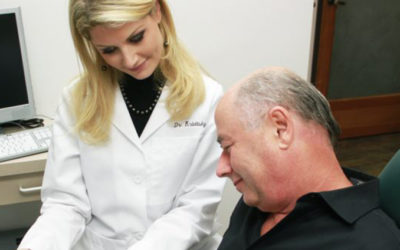Is Gum Disease Linked to Alzheimer’s in Older Adults?
At the CENTER for Advanced Periodontal and Implant Therapy, our team is committed to helping each and every patient achieve healthy, beautiful smiles. We strongly believe that oral health is intrinsically linked with overall health and offer comprehensive and innovative treatments such as periodontal scaling to reduce the bacterium that causes gum disease.
The Oral Origin of Senile Dementia
The researchers from UCLan determined that a link exists between gum disease and the brain disorder Alzheimer’s when comparing brain tissue from patients with dementia to patients without the disorder. The researchers found the bacteria responsible for gum disease within the brain tissue of at least four patients with Alzheimer’s, which did not exist in any tissue samples from those without Alzheimer’s.
Infections, such as periodontal disease, can spread to other parts of the body by entering the blood stream. The infectious bacteria can then spread through the blood-brain barrier where it can cause infection and inflammation within the brain. As the body’s immune system tries to kill off the harmful bacteria within the brain, it unfortunately damages and kills brain cells in the process as well. It is suspected that the loss of brain cells caused by the gum disease bacteria may contribute to the effects of Alzheimer’s.
Oral Risk Factors of Alzheimer’s
Dental and periodontal hygiene is crucial as the human mouth typically contains more than 900 different types of bacteria. While some of these bacteria are benign or even helpful in breaking down food, some can be harmful to your teeth, gums, and other parts of the body. It is suspected that the elderly are more susceptible to oral systemic health issues, such as senile dementia, because many of these individuals rely on dental implants and devices, which can easily harbor yeasts and fungi, particularly if the devices are not thoroughly cleaned every single day.
An additional study, conducted by researchers in Sweden, found that individuals who developed gum disease at a younger age had at least four times greater risk of suffering from Alzheimer’s. In this particular study, the researchers examined the differences, such as lifestyle factors, between 109 pairs of identical twins in order to identify whether gum disease increased the risk of Alzheimer’s or senile dementia.
Fighting Periodontitis
Periodontal disease is prevalent throughout the United States as most children and adults have some degree of infection. The initial stage of condition is known as gingivitis, in which the gums become red and swollen, and may bleed easily when brushing. As the condition progresses, the bacteria and plaque cause the gums to recede away from the teeth, exposing more and more of the “neck” or even the “root” of the teeth. Pockets begin to form around the teeth where bacteria can thrive, breaking down the gum tissue, teeth, and even bone that supports the teeth.
The main goal of treating any stage of gum disease is to control the infection and inflammation. The earliest stages of gingivitis can be successfully eradicated if treated early enough through scaling and root planning, which will eliminate the causes of periodontitis and stop the advancement of gum disease.
Contact the Leading Periodontists in Los Angeles
If you or someone you care about is in need of periodontal care or you are concerned about the oral systemic link between gum disease and Alzheimer’s, please do not wait to contact the CENTER for Advanced Periodontal and Implant Therapy. Our dedicated team of board-certified periodontists Dr. Aalam and Dr. Krivitsky has extensive experience treating and protecting our patients’ smiles with RejuvaGum Lift. For a healthy, beautiful smile, please give us a call at 310.504.1845 to set up an appointment today!
You May Also Like...
Understanding the Microbiome of the Mouth: Why Balance Matters for Gum Health
We often think of brushing, flossing, and regular cleanings as the cornerstones of oral health. But beneath these...
The Real Cure for Periodontitis: Dispelling Myths About Gum Disease Treatment
Periodontitis, commonly known as gum disease, has long been regarded as a chronic condition that can only be managed,...
Senior Periodontal Care and the Challenges Aging Presents
As we journey through the stages of life, there's one aspect that demands consistent consideration — our oral health....



